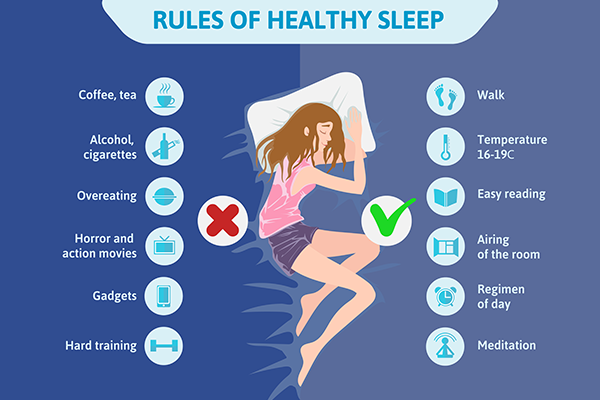
Quality sleep is essential for restoring energy, supporting mental focus, and maintaining overall health. Adopting consistent sleep habits, optimizing your environment, and managing stress naturally improve sleep quality and promote long-term wellness.
Key Takeaways
- Maintain a fixed sleep and wake schedule daily to regulate circadian rhythm.
- Limit screen exposure before bedtime to prevent melatonin suppression.
- Keep your bedroom cool, dark, and quiet for optimal sleep conditions.
- Avoid caffeine, alcohol, and heavy meals several hours before sleeping.
- Engage in daily exercise and relaxation techniques like meditation or deep breathing.
- Consume sleep-supportive foods such as kiwi, almonds, and fatty fish, use supplements like melatonin or magnesium only under medical guidance.
What is Sleep Health?
Sleep health refers to the overall quality and patterns of sleep that support physical, mental, and emotional well-being. Good sleep health means having consistent sleep duration, timing, and quality that leave you feeling refreshed and alert during the day. It involves more than just getting enough hours of rest; it also includes factors such as a regular sleep schedule, minimal disturbances, and the absence of disorders like insomnia or sleep apnea. Healthy sleep is essential for memory, learning, mood regulation, immune function, and long-term health. Poor sleep habits, on the other hand, increase the risk of chronic diseases.
Top 15 Proven Tips to Sleep Better at Night
Sleep is the unsung hero of good health, often overlooked until it becomes a problem. High-quality sleep restores your body, sharpens your mind, and fortifies your immune system. Chronic sleep deprivation, on the other hand, increases your risk for obesity, diabetes, cardiovascular disease, and mood disorders. Productivity, creativity, and emotional resilience all suffer when sleep falters.

1. Maximize Daytime Bright Light Exposure
Your brain’s master clock, the circadian rhythm, depends on cues from sunlight to stay synchronized. Bright light during the day, especially in the morning, boosts alertness and signals your body when to feel awake versus sleepy.
How to implement:
- Get outside for at least 20–30 minutes within two hours of waking.
- Position your work area near a window if possible.
- If sunlight is limited, consider a 10,000-lux light therapy lamp for 20 minutes each morning.
Clinical studies show that increased light exposure improves sleep quality, reduces time to fall asleep, and regulates hormones such as melatonin. This tip is foundational; it “sets the clock” for your entire sleep-wake cycle.
2. Reduce Blue-Light Exposure in the Evening
Screens, phones, tablets, TVs, and even LED bulbs emit blue light, which can delay melatonin production and confuse your circadian rhythm. Too much blue light in the evening tricks your brain into thinking it’s still daytime.
How to implement:
- Dim household lights two hours before bed.
- Avoid all screens for 60–90 minutes before sleep.
- Use blue-light-blocking glasses if screen avoidance isn’t possible.
- Set devices to “night shift” mode.
Studies confirm that reducing blue light in the evening shortens sleep latency and increases REM sleep. Treat light as a tool: use it for alertness in the morning, avoid it when winding down.
3. Keep a Consistent Sleep, Wake Schedule
Your body thrives on routine. A consistent sleep schedule, with the same bedtime and wake-up time every day (even weekends), supports robust circadian rhythms and improves sleep efficiency.
How to implement:
- Set a “wind down” alarm 30–60 minutes before your target bedtime.
- Wake up at the same time daily, regardless of how well you slept.
- Adjust gradually if shifting your schedule: 15–30 minutes earlier or later per day.
Research shows that “social jetlag” staying up or sleeping in on weekends can disrupt your body clock, leading to lower-quality sleep and sluggishness on Mondays. Consistency beats perfection.
4. Short, Early Naps Only
While short naps can refresh your mind, naps that are too long or too late in the day reduce sleep pressure and can make it harder to fall asleep at night.
How to implement:
- Limit naps to 10–20 minutes.
- Nap before 3 p.m. if possible.
- If you struggle with insomnia, skip naps altogether.
Evidence suggests that brief naps improve alertness and performance, but naps exceeding 30 minutes or those taken late in the day are linked to poorer nighttime sleep and grogginess upon waking. Reserve daytime sleep for when you truly need it.
5. Watch Caffeine & Alcohol Timing
Caffeine is a powerful stimulant, with effects that can linger in your system for 6–8 hours or more. Alcohol, though it may help you fall asleep initially, disrupts sleep cycles and reduces restorative deep sleep.

How to implement:
- Avoid caffeine after 2 p.m.; some people may need to stop even earlier.
- Minimize energy drinks, chocolate, and certain teas in the evening.
- Don’t use alcohol as a sleep aid; it fragments sleep and increases wake-ups.
Clinical research links evening caffeine and alcohol consumption to insomnia, light sleep, and next-day fatigue. For optimal sleep, limit or eliminate both in the hours before bed.
6. Limit Liquids & Heavy Meals Before Bed
Waking up to use the bathroom (“nocturia”) is a common but avoidable sleep disruptor. Heavy meals before bed can cause indigestion and discomfort.
How to implement:
- Stop drinking large amounts of liquids at least 1–2 hours before bed.
- Eat dinner at least 2–3 hours before sleeping.
- If hungry, have a light snack such as a banana or small handful of nuts.
Research shows that late night eating is associated with increased sleep disturbances. Simple dietary timing can make a significant difference.
7. Create a Cool, Quiet, Dark Sleep Sanctuary
Your bedroom environment is critical. Cool temperatures help signal the body it’s time for rest. Noise, excess light, and visible electronics can all hinder sleep.
How to implement:
- Set room temperature to 60–67°F (16–19°C).
- Use blackout curtains or an eye mask.
- Eliminate all light sources, cover LEDs or unplug unnecessary electronics.
- Use earplugs or a white noise machine to mask disruptive sounds.
- Remove or turn off visible clocks to avoid “clock watching.”
Sleep scientists have repeatedly shown that cooler, quieter, darker bedrooms dramatically improve sleep quality, especially for people with insomnia. Make your bedroom a true sleep haven.
8. Reserve Bed Only for Sleep and Sex
Training your brain to associate bed with sleep is a cornerstone of “stimulus control therapy,” a gold-standard behavioral treatment for insomnia.
How to implement:
- Don’t read, watch TV, or work in bed.
- If you can’t sleep after 20 minutes, get up and do something relaxing in dim light, then return to bed when sleepy.
This practice strengthens the mental link between bed and sleep, making it easier to fall asleep and stay asleep.
9. Wind-Down Ritual: Relaxation Before Bed
A calming wind-down routine tells your mind and body that sleep is near. This is not a luxury, it’s a proven way to reduce stress hormones and induce drowsiness.
How to implement:
- 30–60 minutes before bed, engage in quiet activities: reading (on paper), gentle stretching, and listening to calm music.
- Try relaxation techniques like the “4-7-8” breathing method or progressive muscle relaxation.
- Keep the lights low.
Clinical studies confirm that regular pre bed routines decrease time to fall asleep and improve overall sleep quality. Avoid anything stimulating, no doom-scrolling or stressful news.
10. Use Warm Shower/Bath ~1–2 Hours Before Bed
A warm shower or bath can help you fall asleep faster by lowering your core body temperature after you leave the water.
How to implement:
- Take a 10–30 minute shower or bath 1–2 hours before bedtime.
- Let your body cool naturally as you prepare for bed.
Research shows this “temperature drop” effect encourages sleep onset and is particularly useful for people who struggle to wind down in the evening.
Foods that helps in Quality Sleep
Certain foods are known to support relaxation and quality sleep, thanks to their unique nutrients.
| Food | Sleep-Promoting Nutrients/Compounds | How It Helps |
| Tart cherries | Melatonin, tryptophan | Boosts melatonin; improves sleep quality |
| Kiwi | Serotonin, antioxidants | Shortens time to fall asleep |
| Bananas | Magnesium, potassium, vitamin B6, tryptophan | Relaxes muscles; supports melatonin |
| Almonds | Magnesium, melatonin | Promotes relaxation and deeper sleep |
| Walnuts | Melatonin, healthy fats | Regulates sleep-wake cycle |
| Turkey | Tryptophan, protein | Increases serotonin and melatonin |
| Salmon (fatty fish) | Omega-3, vitamin D | Regulates serotonin; supports sleep |
The Role of Sleep Supplements
While natural strategies like maintaining a consistent sleep routine and improving sleep hygiene are often the best approaches to enhancing sleep, some individuals may benefit from sleep supplements. Melatonin, a hormone that regulates sleep-wake cycles, is one of the most commonly used supplements, particularly for circadian rhythm disorders or jet lag. Other options, like magnesium or valerian root, may also support relaxation and promote better sleep.
However, it’s crucial to consult a healthcare provider before starting any supplement regimen, as improper use can lead to dependency, side effects, or interactions with other medications. Supplements should be seen as a short-term solution, complementing broader efforts to address the underlying causes of sleep disturbances for long-term improvements.
Conclusion
Quality sleep is crucial for cognitive function, emotional stability, and physical health. To improve sleep, experts recommend a consistent sleep schedule, maximizing morning daylight exposure, and developing a relaxing wind-down routine in the evening. Avoid blue light from screens for at least an hour before bedtime and limit caffeine or large meals later in the day. Keep naps short and schedule them for early afternoon only. Sleep in a cool, dark, and quiet environment and use your bed solely for sleep or intimacy to strengthen the mental connection between bed and sleep.
Engage in regular exercise but finish workouts well before bedtime, and try calming techniques like meditation or deep breathing. Foods such as tart cherries, kiwi, bananas, almonds, walnuts, turkey, and fatty fish offer nutrients that support sleep. Natural supplements like melatonin, magnesium, or valerian root may help, but should only be used after consulting with a healthcare provider. Consistent practice of these habits transforms sleep quality and overall well-being.
FAQs
Is it okay to nap, and for how long?
Short naps of 10–20 minutes before mid-afternoon can boost alertness without harming nighttime sleep. Avoid longer or late-day naps, which may interfere with sleep pressure and circadian rhythm.
What should I do if I can’t fall asleep after 20 minutes?
Leave the bed and do a relaxing, tech-free activity in dim light. Return to bed only when sleepy. This retrains your brain to associate bed with sleep.
Does yoga or stretching really help sleep?
Yes, studies show that gentle evening yoga or stretching routines lower stress and promote relaxation, making it easier to fall and stay asleep.
Are supplements like melatonin or magnesium safe and helpful?
Short-term use of melatonin or magnesium is generally safe for most healthy adults. Use low doses, try one at a time, and consult a healthcare provider if you have medical conditions or take other medications.
Is screen time before bed really that harmful?
Yes. Blue light from screens suppresses melatonin, delays sleep onset, and disrupts sleep cycles. Avoid screens for 60–90 minutes before bedtime.
What’s the ideal room temperature for sleep?
Experts recommend 60–67°F (16–19°C). Cooler temperatures help your body signal that it’s time for sleep.
How long before bed should I stop eating or drinking?
Finish large meals at least 2–3 hours before bed and limit liquids 1–2 hours before bedtime to reduce the risk of indigestion or nighttime bathroom trips.
Can I shift my sleep schedule gradually?
Yes. Adjust your bedtime and wake time by 15–30 minutes each day until you reach your goal. Be consistent, even on weekends.
Does exercise at night hurt sleep quality?
Vigorous exercise within 2–3 hours of bedtime may impair sleep, but gentle movement or yoga can help. Most people benefit from regular daily activity.
Are there natural hacks if I wake up in the night?
Try gentle stretching, breathing exercises, or moving your eyes left-right for 30 seconds. Avoid screens and return to bed only when drowsy.
Reference
- Harvard Health Publishing. (2017). Successful aging: 10 tips for better sleep. Retrieved from https://www.health.harvard.edu/staying-healthy/successful-aging-10-tips-for-better-sleep
- UC Davis Health. (2023). Try these 13 tips to help you sleep better. Retrieved from https://health.ucdavis.edu/news/headlines/try-these-13-tips-to-help-you-sleep-better/2023/07
- Somnee. (2024). 10 Tips for Better Sleep, from Dr. Matthew Walker. Retrieved from https://somneesleep.com/blogs/post/matt-walker-sleep-tips
- American Academy of Sleep Medicine. (2024). Improve your sleep in five simple steps. Retrieved from https://sleepeducation.org/improve-your-sleep-in-five-simple-steps/
- Sleep Foundation. (2023). The 20 ultimate tips for how to sleep better. Retrieved from https://www.sleepfoundation.org/sleep-hygiene/healthy-sleep-tips
- National Center for Biotechnology Information. (2021). Sleep health promotion interventions and their effectiveness. Retrieved from https://pmc.ncbi.nlm.nih.gov/articles/PMC8196727/
- Healthline. (2024). Top 15 proven tips to sleep better at night. Retrieved from https://www.healthline.com/nutrition/17-tips-to-sleep-better
- Mayo Clinic. (n.d.). Sleep tips: 6 steps to better sleep. Retrieved from https://www.mayoclinic.org/healthy-lifestyle/adult-health/in-depth/sleep/art-20048379
Dr. Nathalia Estes is an ND trained at Accredited ND Program, Year, licensed in States With 10 years in integrative practice, she focuses on evidence guided botanicals, nutrient repletion, and lifestyle counseling. She has presented at conference and participated in quality-assurance reviews for herbal products. Verify licensure scope by state, see NPI, and review disclosures on affiliations and samples.

